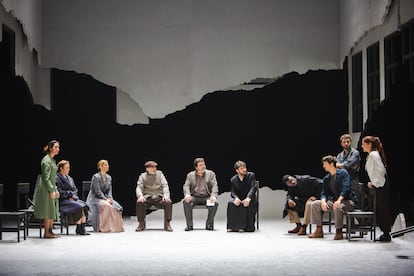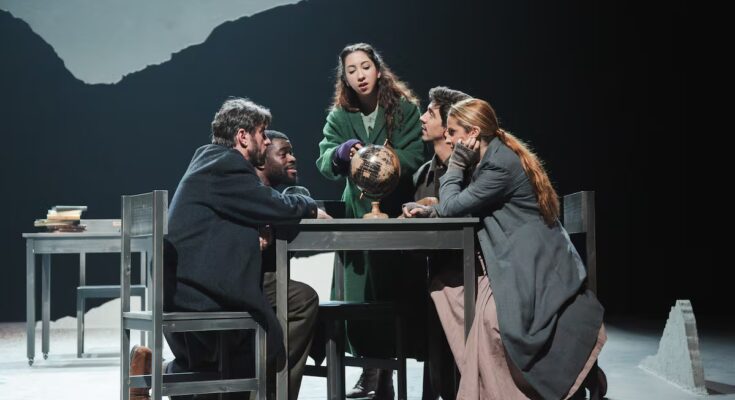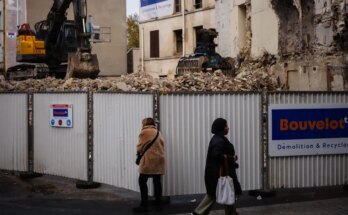Three shows that have education as their central axis coincide these days in the theater program: Francisco Ferrer. Long live the Modern School!, Story of a teacher AND The lost school. “To train critical citizens, not obedient subjects: human beings aware of their rights and dignity”, says the playwright and academic José Luis Gómez, who at 85 years old and celebrating the 30th anniversary of the Teatro de la Abadía in Madrid, which he himself created, confesses that he is faced with what he considers one of the best productions of his very long career. Francisco Ferrer Long live the Modern School!which is performed in the Abbey until 7 December.
With Ernesto Arias, Jesús Barranco, David Luque and Lidia Otón, this work, based on the book by the Belgian Jean-Claude Idée, reconstructs the dubious judicial trial of the pedagogue and activist, subversive millionaire and founder of the Modern School, sentenced to death and executed in 1909, accused of being one of the instigators of the events of the Tragic Week in Barcelona. “Ferrer paid with his life for the defense of freedom of thought and this makes us, as a civil society, eternally indebted to him. In a world where information abounds but understanding is scarce, where technology grows faster than our ethical conscience, Ferrer reminds us that educating is not domestication, but awakening”, says Gómez, for whom theater has that exceptional power to make visible what society sometimes prefers to silence. “And to remember and teach what perhaps we are forgetting,” he adds.
Ernesto Arias, one of Spain’s most solid theater actors, plays on this occasion Francisco Ferrer, the anarchist of his youth who abandoned violence to embrace his commitment to teaching and who planted a sculpture in front of the University of Brussels (Belgium). “He was a free thinker who contributed to forming a cultured and educated society with the aim of preventing its manipulation, which is very relevant today. There is no doubt that society progresses and that everything moves forward, but it is advisable to look at the past so as not to forget, to learn from what is worth discussing. Manipulation on social networks is fought with good education,” says Arias.
A few years after the death of Francisco Ferrer, in 1923, under the dictatorship of Primo de Rivera, a passionate young woman convinced of the power of teaching, wanting to change things, began working in rural schools. She is Gabriela López, the protagonist of the book that her daughter, also a teacher Josefina Aldecoa (La Robla, 1926 – Mazcuerras, 2011), wrote years later as a tribute and memory to the woman from whom she took up the baton and inherited her faith in freedom and teaching, a profession she practiced during Franco’s dictatorship. Story of a teacher will be at the Valle Inclán theater in Madrid from November 21st to January 11th, in a production directed by Raquel Alarcón together with Laura Ortega and adapted by Aurora Parrilla.
Under a changing scenography by Pablo Chaves, of walking shadows, of leafy trees that appear and disappear, of desks in the classrooms and of seas that can be seen in the background, this great production sees 12 performers on stage, with Julia Rubio (in the role of Gabriela López) and Manuela Velasco (in the role of Josefina Aldecoa).

The director of Story of a teacherRaquel Alarcón is a pedagogue, language and literature teacher and advocate for community work. «Before being a director and actress, I was a teacher», she explains the reason for her enthusiasm when faced with the proposal from Alfredo Sanzol, director of the National Drama Center. “The theater is like a classroom, a place of meeting and learning, of discovery and transformation,” says Alarcón. “Josefina Aldecoa and her mother were examples of the value of teaching, of the need to learn and discover. We must face silences and reawaken historical memory”, she defends, proclaiming together with the author of the adaptation, Aurora Parilla (Alcalá de Henares, 27 years old), the need to protect public education and the space of freedom in classrooms.
“Her motherhood put her face to face with the dream of becoming a teacher, a current conflict that all women face,” adds Parrilla, whose adaptation of the book (published by Anagrama) was absolutely faithful.
Gabriela López was one of the thousands of teachers who practiced their profession during the Second Republic, and whose defeat after the coup of General Franco and the Civil War put an end to one of the most exciting projects launched in the years from 1931 to 1936. The function bears good witness to this. The lost schoola collective creation of the Solo es Nuestro Deseo company, which is a tribute to the republican schools of Madrid and the difficult situation of starting the school year in September 1936 with the Civil War starting in July of that same year. The show, composed of eight stories based on real people and eight non-professional actors (five women and three men), and directed by Toni Ruiz (Buenos Aires, 1975), is performed every Thursday at the Tarambana theater in Madrid.
The idea for this production came from Carlos Díez, one of the actors, a retired history professor and activist for historical memory. “The Second Republic made the important decision to transform a fundamentally private and religious education into a public and secular one. I often wonder what Spain would have been like if we had continued with that education and even more so in these times of the rise of the far right”, comments Toni Ruiz, who defines himself as a “theater militant”. “If theater has always been a fundamental art, today, in the era of immediacy and TikTok, it is even more so”.



